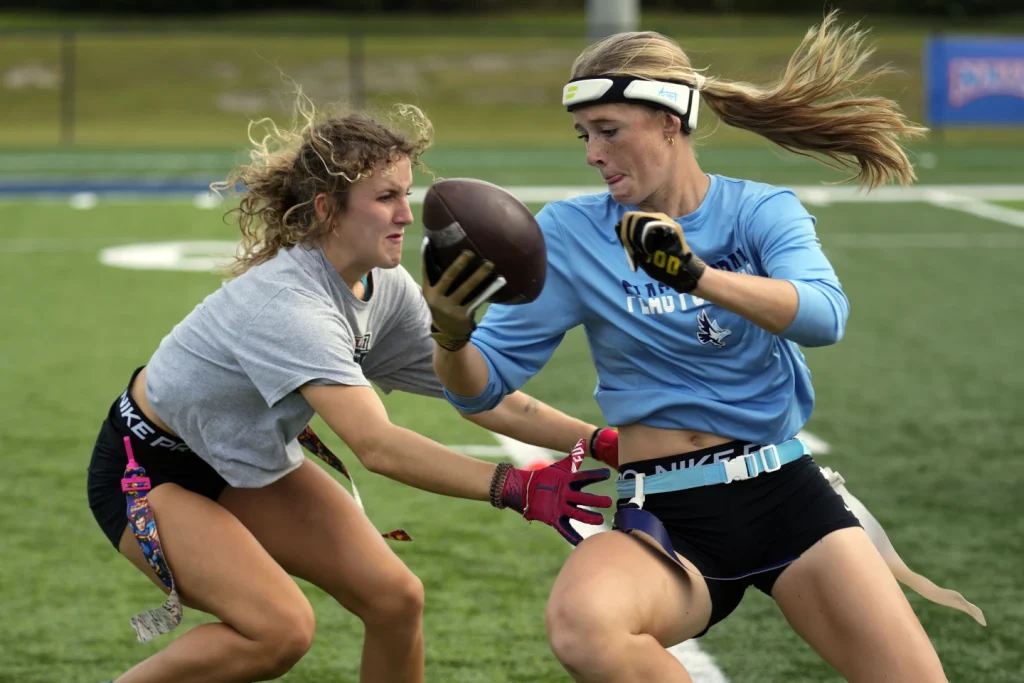In the world of sports, the journey of female athletes has been one marked by challenges, perseverance, and triumph.
The story of Jo Overstreet, a standout flag football player, reflects this narrative, shedding light on the evolution of women’s participation in a traditionally male-dominated sport.
Overstreet’s experience of longing for a sense of sisterhood amidst her participation in boys’ teams in Texas serves as a poignant reminder of the importance of inclusivity and community in sports.
However, as she reflects on the present, Overstreet sees a burgeoning community of female athletes, all contributing to the elevation of flag football to new heights.
This essay will delve into the remarkable growth of female flag football, exploring the strides made in fostering inclusivity, creating opportunities, and ultimately securing a place for women in a sport that was once primarily associated with men
The meteoric rise of female flag football has been nothing short of remarkable. What was once a sport predominantly played by boys has now evolved into a vibrant community encompassing females of all ages and abilities.
The inclusion of flag football in the Olympic program for the 2028 Summer Games in Los Angeles stands as a testament to the sport’s growing prominence and the increasing recognition of female athletes within it.
The expansion of girls-specific teams and leagues across the nation, and indeed across continents, has catalyzed the sport’s evolution, paving the way for a new generation of female flag football players to thrive.
The institutional support for female flag football has been instrumental in propelling its growth. Notably, eight states have officially sanctioned girls flag football as a high school varsity sport, with additional states initiating pilot programs to further integrate the sport into their athletic curricula.
Moreover, the availability of college scholarships for female players at the NAIA level has opened doors for aspiring athletes, providing tangible pathways for pursuing their passion for flag football at the collegiate level.
The endorsement of flag football by the NFL through leagues and events has also bolstered the sport’s visibility and credibility, signaling a significant shift in the landscape of women’s sport
The newfound opportunities for female flag football players have redefined the realm of possibilities for aspiring athletes.
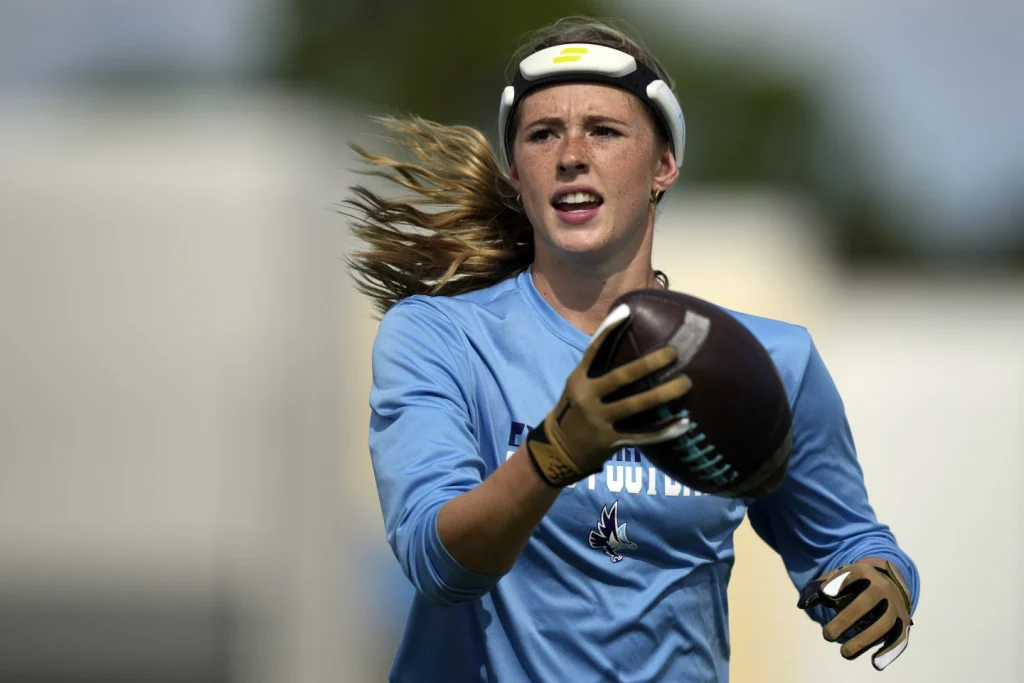
For Overstreet, a former basketball player at the University of Houston, the prospect of competing for a spot on the inaugural Olympic roster represents a culmination of her lifelong dedication to sports.
The significance of this milestone extends beyond individual aspirations, serving as a beacon of hope for countless young girls who now have the chance to dream of pursuing football at the highest level.
The realization of such aspirations underscores the transformative impact of inclusivity and opportunity within the realm of sport
Flag football holds a special place in the collective memory of many, evoking nostalgic recollections of childhood games and communal play.
Its reemergence in the public eye, particularly through the NFL’s integration of flag football into its Pro Bowl festivities, has reignited interest in the sport and reinforced its cultural significance.
As flag football continues to transcend gender boundaries and gain traction as a sport for all, its capacity to foster camaraderie, sportsmanship, and athleticism remains a powerful force in bringing communities together.
The journey of female flag football stands as a testament to the resilience, determination, and collective progress of women in sports.
From the days of yearning for a sense of sisterhood to the present landscape of thriving female flag football communities, the sport has undergone a remarkable transformation.
The institutional support, recognition, and newfound opportunities have paved the way for female athletes to pursue their dreams and redefine the narrative of women in sports.
As flag football prepares to take center stage at the 2028 Summer Olympics, it symbolizes not only the triumph of individual aspirations but also the triumph of inclusivity and the enduring spirit of sportsmanship.
The rise of female flag football is a celebration of unity, resilience, and the limitless potential of women in sport
Flag football, a modified version of American football, has gained significant traction on the international stage.
With five players per side on a field measuring 50 yards in length, along with 10-yard end zones, and 25 yards in width, the game offers a dynamic and fast-paced experience.
Notably, every offensive player is an eligible receiver, adding an element of versatility and excitement to the game.
The sport’s appeal has transcended traditional boundaries and has witnessed a surge in participation, particularly among young girls.
Research conducted by USA Football revealed a remarkable 178% increase in the participation rate for girls aged 6-12 between 2014 and 2022.
This surge is indicative of the sport’s growing popularity and its ability to attract a diverse range of participants.
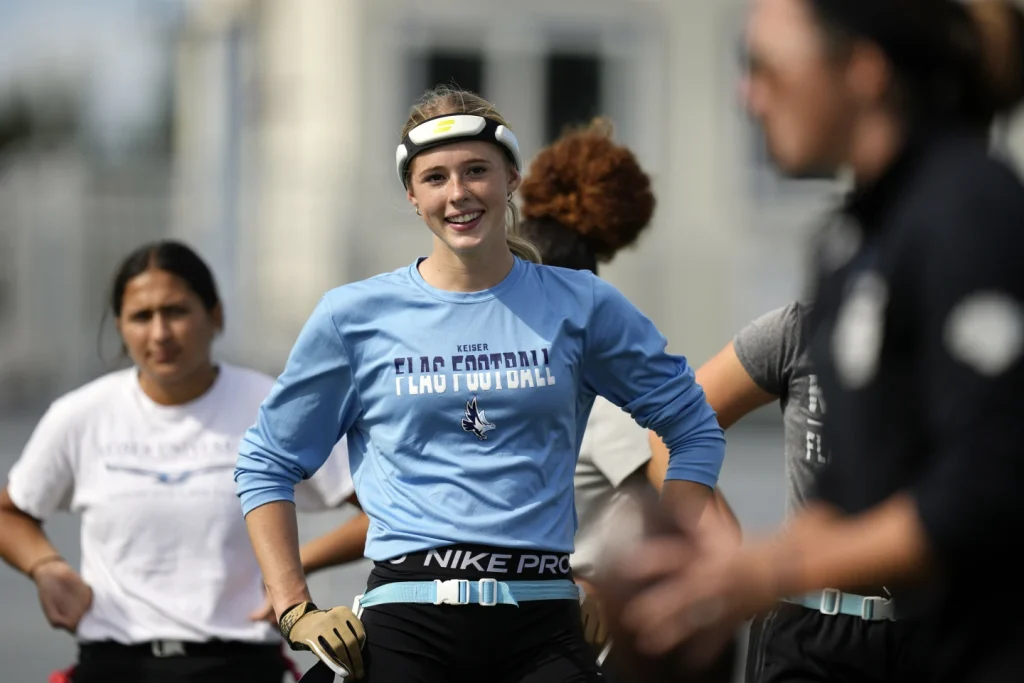
One remarkable example of this trend is the story of Makayla Martinez, a 14-year-old wide receiver from Phoenix. Her journey into flag football exemplifies the sport’s ability to captivate young athletes.
Martinez’s initial reluctance to join a girls’ team was transformed into enthusiasm when she recognized the growing opportunities within flag football.
Her experience reflects the transformative impact of the sport, not only in terms of participation but also in providing avenues for young athletes to thrive.
The rise of flag football as a varsity girls’ sport in several states, including Alabama, Alaska, Arizona, California, Florida, Georgia, Nevada, and New York, underscores the sport’s increasing acceptance and recognition.
Furthermore, the transition of flag football from a club sport to an officially recognized athletic pursuit in New Jersey, under the oversight of the New Jersey State Interscholastic Athletic Association, reflects the sport’s evolution and its growing status within the educational system.
The support and influence of the National Football League (NFL) have been instrumental in fostering the growth of flag football.
The league’s proactive measures, such as organizing camps, clinics, a circuit, and exhibitions, have significantly contributed to the sport’s visibility and appeal.
The NFL’s involvement has not only elevated the profile of flag football but has also provided aspiring athletes with valuable opportunities for development and exposure.
In conclusion, the rise of flag football on the international stage is a testament to its inclusive nature and its ability to engage and inspire young athletes.
The sport’s rapid growth, particularly among girls, underscores its potential to shape the future of athletic pursuits.
With the support of organizations such as USA Football and the NFL, flag football is poised to continue its ascent, offering a compelling and accessible avenue for individuals to pursue their passion for the game.
As flag football continues to expand its reach and influence, it is clear that its impact will extend far beyond the confines of the field, leaving a lasting impression on the sporting landscape.
The Klam family of Austin, Texas, has undergone a remarkable transformation in their sporting pursuits. Once deeply entrenched in the world of baseball, the family now finds itself fully immersed in the exhilarating realm of flag football.
Jason and Amberly Klam, the proud parents, have not only embraced this shift but have also taken proactive steps to foster the growth of female flag football teams, exemplifying a dedication that extends beyond their own familial interests.
At the heart of this narrative lies their daughter, Ashlea Klam, a prodigious talent who has been a shining star in the sport since her early years.
Her journey began when she fearlessly stepped onto the field at the age of 7, joining a boys’ team and defying gender norms.
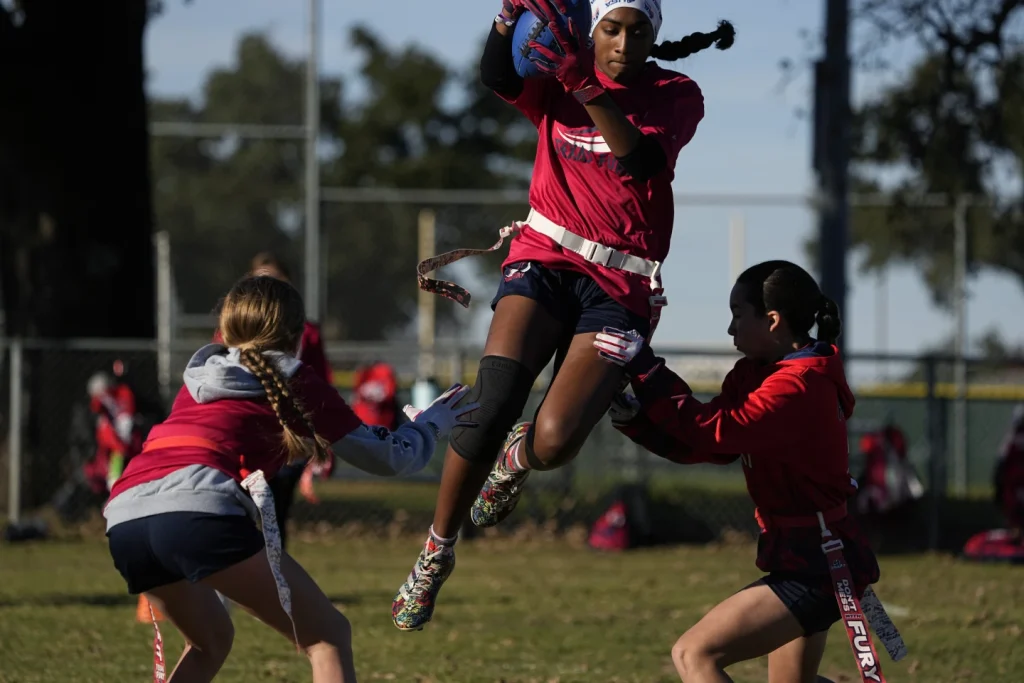
Subsequently, she transitioned to an all-girls squad, embarking on a series of travels and competitions that ultimately culminated in the establishment of the Texas Fury, an all-girls flag football select travel team.
What started with a modest group of six girls has now burgeoned into a formidable entity boasting over 60 players and seven distinct teams spanning various age groups.
Ashlea’s exceptional prowess in flag football has not only garnered admiration but has also opened doors to new opportunities.
Her talent has been duly recognized, leading to a well-deserved flag football scholarship at Keiser University in West Palm Beach, Florida.
This achievement not only marks a personal triumph for Ashlea but also serves as a testament to the growing prominence of flag football within collegiate sports.
Furthermore, the recent success of Ottawa University in Kansas, securing their third consecutive NAIA women’s flag football title, underscores the escalating significance of the sport on the national stage.
The pivotal moment arrived when flag football was officially included in the 2028 LA Games, signaling a monumental milestone for the sport and its dedicated proponents.
Ashlea’s impassioned advocacy for the incorporation of girls flag football as a varsity sport in Texas high schools exemplifies her unwavering commitment to fostering inclusivity and opportunity within the sporting landscape.
The prospect of flag football’s inclusion in the Olympics has ignited a renewed sense of optimism, with Jason Klam expressing profound elation at the realization of a long-cherished dream.
The burgeoning rivalry between the U.S. and Mexico in women’s flag football serves as a compelling testament to the sport’s escalating global appeal.
The electrifying showdowns and stellar performances on the international stage foreshadow a thrilling gold-medal spectacle at the LA Games, underscoring the sport’s potential to captivate audiences worldwide.
As the anticipation builds, the commencement of official USA Football sanctioned events, tournaments, and combines heralds the commencement of an arduous yet exhilarating selection process, beckoning a new era of talent and competition.
The announcement of flag football’s inclusion in the Olympics has catalyzed an unprecedented surge in participation, with Scott Hallenbeck, the CEO of USA Football, underscoring the sport’s meteoric growth trajectory.
The emergence of athletes like Madison Fulford, whose remarkable journey from an intramural league to the national team epitomizes the sport’s transformative power, serves as a compelling testament to the allure of flag football.
Fulford’s unwavering commitment to inspiring the next generation of female flag football players through her tireless endeavors as an Air Force mental health counselor and her involvement in flag football skills camps epitomizes the spirit of mentorship and empowerment that defines the sport’s evolving ethos.
The narrative of women’s flag football is a testament to the indomitable spirit of perseverance, passion, and progress.
As the sport continues to ascend to unprecedented heights, it embodies a profound narrative of inclusivity, empowerment, and the unwavering pursuit of excellence.
The forthcoming Olympic spectacle and the sport’s prospective inclusion in the 2032 Brisbane Games serve as poignant symbols of a journey marked by triumph, tenacity, and the unyielding pursuit of a collective dream.
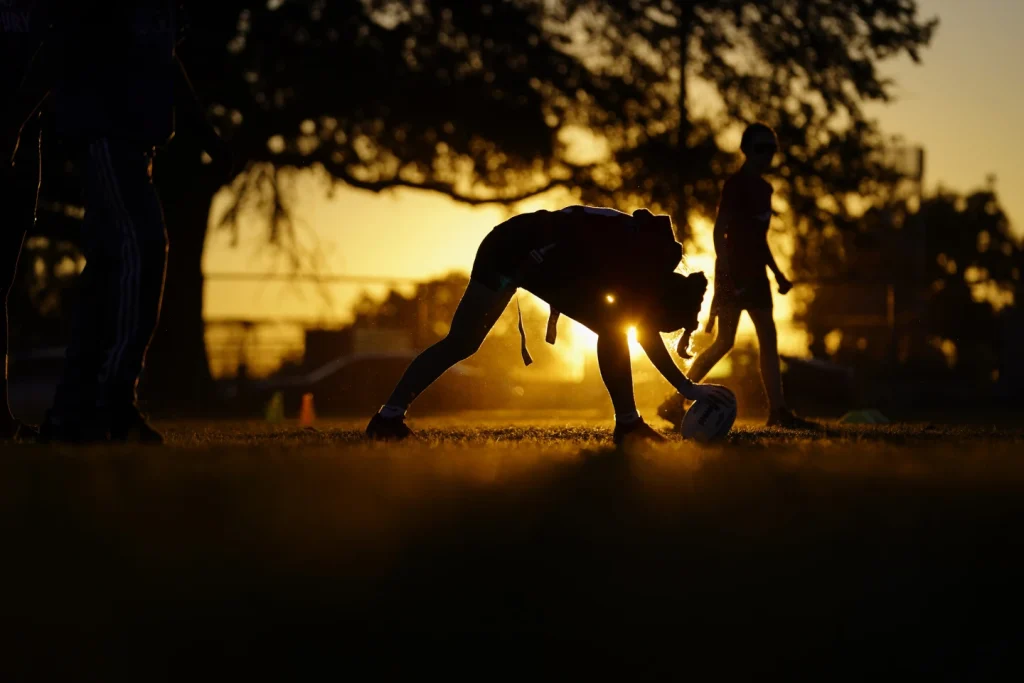
In conclusion, the rise of women’s flag football stands as a testament to the transformative power of sports, transcending boundaries, and inspiring generations to come.
The Klam family’s unwavering dedication, Ashlea’s remarkable journey, and the burgeoning global resonance of the sport collectively illuminate a narrative defined by resilience, camaraderie, and the enduring pursuit of a shared vision.
As the world eagerly awaits the spectacle of flag football on the grandest stage, the spirit of unity, athleticism, and unyielding determination serves as a poignant reminder of the enduring power of human endeavor.
